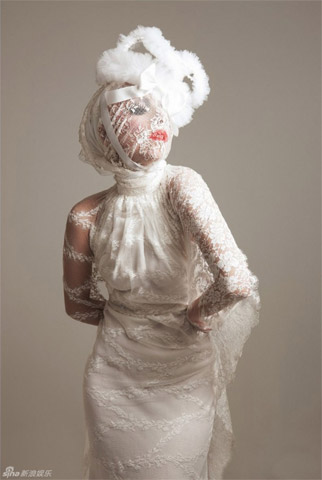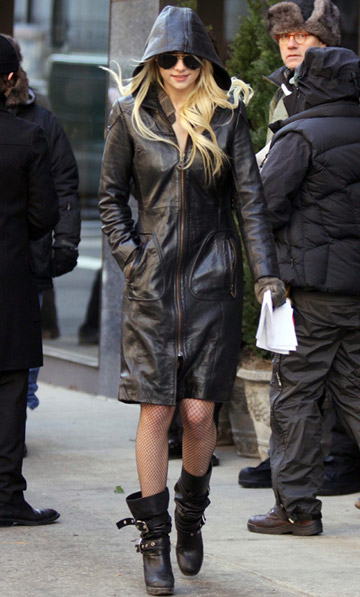 Paweł Lewandowski
Paweł Lewandowski Julia Alcântara
Julia Alcântara Crystii Lin
Crystii Lin Mirka Germanova
Mirka Germanova Guiri Uribe
Guiri Uribe
 Katy Perry has fuelled rumours that she is pregnant with fiancé Russell Brand after the pair were reportedly spotted browsing in a London baby boutique over the weekend.
Katy Perry has fuelled rumours that she is pregnant with fiancé Russell Brand after the pair were reportedly spotted browsing in a London baby boutique over the weekend.
The couple became engaged during a Christmas break in Thailand and speculation shortly followed that they are now expecting their first child.
According to The Sun, Brand and Perry were snapped looking at a range of baby shoes in a North London store on Sunday.
A source said: "Russ and Katy had a wander around Hampstead. They visited children's shoe shop Cubs and had a lot of fun checking out all the little bootees."
Italy's fashion sector will emerge from the financial crisis before others but the government needs to help companies be more competitive, the head of an industry body said on Tuesday.
Italy's fashion industry called for government help last year as the global financial crisis sapped demand for its clothes, shoes and handbags.
Despite the crisis not yet being over, current sales are going well, said Michele Tronconi, head of Sistema Moda Italia (SMI), which represents the textile and clothing industry.
"In the last few months, there has been a change in pace, now there is a favorable context for various reasons," he told reporters at the Pitti Uomo menswear trade fair.
"The crisis is not yet over but (fashion) is a sector that was hit by the crisis first and it will come out of the crisis before others."
SMI said in November it expected turnover for the clothing and textile sector to fall 16 percent in 2009 to 45 billion euros ($65.32 billion).
Luxury groups are focusing on winning back consumers as they emerge from the economic crisis. Italians have braved cold weather to snap up discounted goods at their favorite designer or high-street fashion stores during the current winter sales period.
"Shop sales at this moment are going very well," Tronconi said.
He cited tax credits, the lowering of energy costs and a traceability system as helpful measures for the industry.
"From the last few meetings, I am confident something will be done soon," he said.
bebe stores, inc. reported retail sales of $135.5 million for the fiscal quarter ended January 2, 2010, a decrease of 23.1% compared to sales of $176.3 million for the fiscal quarter ended January 3, 2009. Comparable store sales for the fiscal quarter ended January 2, 2010 decreased 22.5% compared to a decrease of 20.1% in the prior year. Beginning in November fiscal 2010 comparable store sales exclude the 62 PH8 stores due to the conversion of BEBE SPORT stores to PH8 stores.
Retail sales for the year-to-date period ended January 2, 2010 were $255.7 million compared to $333.6 million for the year-to-date period ended January 3, 2009 a decrease of 23.4%. Comparable store sales for the year-to-date period ending January 2, 2010 decreased 24.1% compared to a decrease of 16.0% for the year-to-date period ending January 3, 2009.
As of January 2, 2010, average finished goods inventory per square foot was approximately 15.7% lower as compared to the prior year.
bebe stores, inc. designs, develops and produces a distinctive line of contemporary women’s apparel and accessories, which it markets under the bebe, PH8 and 2b bebe brand names. bebe currently operates 309 stores, of which 213 are bebe stores, 62 are PH8 stores, 33 are 2b bebe stores and 1 is a bebe accessories store. These stores are located in the United States, U.S. Virgin Islands, Puerto Rico and Canada.
Co-founders Dan Single and George Gorrow said they had been "struggling to achieve the margin necessary to fund the growth and development of the brand".
Voluntary administration was the "only way to ensure the future of ksubi", they said in a statement.
"We are and will remain fully committed to the ksubi brand and in assisting the administrator to achieve the best possible outcome," they said.
The pair said there had been "significant attempts" in recent times to address ksubi's financial difficulties. These had included "licensing the manufacturing and distribution of the brand to a culturally aligned, Australian-based company with overseas production experience and networks".
"However, despite best efforts it has not been possible to formalise a new restructure leading to the appointment of an administrator," the pair said.
"Ksubi is grateful for the loyalty shown by its suppliers through this difficult period."
The ksubi label, created in 2000, is well known for its jeans and denim range. There are three ksubi stores in Australia and one in New York. The company employs about 20 people.
Administrator Paul Billingham said in a statement it was "business as usual" for ksubi.
"Our job is to try and preserve the inherent value of the business and we will be working closely with the directors and key stakeholders to do this,"he said.
It was understood that Westpac had pushed for administrators to be appointed.
Lady Gaga sports an avant-guarde grace style in fresh smoke-eye makeup and a delicate veil gown on the cover of 944 magazine's 2010 January issue.




Taylor Momsen pictured on the set of "Gossip Girl" in Uptown, Manhattan, January 7, 2009.



The Social Partners of the European Leather Industry (Cotance) addressed, in their Social Sectoral Dialogue Committee Meeting in December 15 in Brussels), the allegations made to the leather industry in general and to certain European tanneries and their customers in particular in the Greenpeace report released over internet on the deforestation of the Amazon.
They appreciate the gravity of the problem uncovered by Greenpeace and express upfront their solidarity with the objective of preserving the environment and notably the avoidance of irresponsible harm to the Amazon rainforest. The European Social Partners dissociate themselves from any form of unsustainable generation of hides and skins notably the one highlighted in the Greenpeace report.
However, Cotance and ETUF-TCL regret the distorted vision mentioned in the report between the deforestation issue and the leather industry that has been further conveyed in the general press, amplifying the damage caused to the image of the leather industry and to the reputation of the people who work in the leather value chain including European tanners and their customers.
Last fall outspoken economist Noriko Hama caused a fuss with an essay about deflation in the magazine Bungei Shunju. She said that the trend of yasuuri kyoso (low price competition) was "destroying society," and not just in Japan. However, in Japan she singled out the clothing retailer Uniqlo as the main representative of this "self-strangling" movement.
Tadashi Yanai, the chairman of Uniqlo's parent, Fast Retailing, didn't mention Hama's essay when he gave an interview to Asahi Shimbun last month, but he's obviously sensitive to such charges. He said the real cause of deflation isn't competition but rather sluggish consumer spending.
That sounds logical, but it's not as if the two phenomena aren't related. During the bubble era of the 1980s, Japan was notorious for its high consumer prices and in the two decades that have elapsed since then these prices have come down. At the same time, the consumer base has shrunk as the population aged and niche markets became more dynamic.
Consequently, the most intractable problem for the retail sector is that the majority of Japanese have everything they need. There are fewer new Japanese taking the place of older consumers, and those who are coming of consumption age are facing poorer employment opportunities, thus giving them less guaranteed disposable income than their parents had when they entered the work force. This new layer of consumers grew up during a time when low price competition became the norm. They have been conditioned to seek out bargains and gain personal satisfaction from saving money.
It's not a novel idea, but thanks to years of gleeful media coverage of anything labeled gekiyasu (extremely cheap) — from rock-bottom supermarket sales to celebrities devising ways to live on ¥100 a day — retailers are being forced to offer lower and lower prices just to stay in business. Gekiyasu is practically a philosophy, and many TV series are built around the concept. Despite the attention paid to the Michelin restaurant guide, the majority of food shows focus on "B-class gourmet" tours and home cooking on the cheap. Gorgeous meals are only covered if they have an economical angle, and while this is a welcome change from the old model of TV personalities gobbling expensive melons and partaking of 50-year-old wines that viewers could never hope to sample, it indirectly puts pressure on businesses that may not be able to offer bargains every day of the week.
Even retail sectors that were traditionally excluded from price considerations have been affected. Two months ago, the retailer Seiyu was running TV ads for its yearend gift selection with actor Koji Ishizaka saying, "I didn't spend less money for your present, but I did get more for my money." Gekiyasu has become a kind of devil's bargain for the media. Programs about cheap consumption get high ratings and magazine articles about saving money sell well, but in the long run deflation undermines companies' ability to buy advertising. Several weeks ago, Tomoaki Ogura, the host of Fuji TV's wide show, "Toku Da Ne," remarked during a report about deflation that his occupation may be complicit in its own demise.
Yanai can be called the godfather of this philosophy, since he found a way of convincing consumers to buy stuff they didn't really need. If the jeans are only ¥990, you can buy a pair for every day of the week. That is what Hama is referring to when she talks about "Uniqlo-style deflation." She isn't blaming Yanai for the problem. She is simply holding the store up as it's prime example. Once Uniqlo was the upstart. Now it's the norm.
But as Hama said in a recent conversation in Aera, if things proceed as they are future new consumers won't even be able to afford Uniqlo. "People who work in automobile factories can't buy automobiles," she points out, "and people who build houses can't buy homes." So even though things are becoming cheaper, wages and salaries are dropping just as steadily if not faster.
The problem is structural. Japan's legendary expansion in the 1960s and then the repeat growth spurt in the 1980s were the consequences of life changes for the generation called dankai sedai, usually translated as "postwar baby boomers" but representing a narrower range of ages than that represented by the same term in the West. This group entered the work force in the 1960s and were encouraged to buy everything, since they had nothing and their parents had less. Then in the 1980s they were encouraged to buy homes, thus priming the real-estate bubble.
The "dankai juniors," meaning the children of the boomers, came of age in the early 1990s, and though they had fewer job opportunities than their parents, their ranks were large enough to keep consumption levels high. But in the last decade the subsequent generation of workers hasn't been able to keep consumption at the same level, which is ironic because 2002-2007 marked the longest period of expansion in postwar Japan. If the average person didn't feel the benefits, it's because it was all tied to exports. Japanese companies remained competitive overseas by downsizing domestic work forces and keeping a lid on wages. Older people have everything they need, but younger people simply don't have the money to buy what they need or want. The Japanese economy may be suffering due to excess competitiveness, but it's not retail competitiveness, it's the competitiveness of companies that say they have to keep salaries low to survive.
The solution is to give young people more money. If they have cash to spend, population contraction won't be as much of a problem, but Japanese businesses say they can't do it. If these companies really wanted to help the country, they would pay workers wages they could live on. They'd also encourage their older workers to retire, thus forcing them to spend their savings, the sooner the better.
In a step toward hitting its ambitious earnings targets for 2020, the operator of the Uniqlo casual clothing chain reported a 49-percent jump in group operating profit for the latest quarter.
Fast Retailing Co. revised upward its forecasts for the year ending August 2010 to a group pretax profit of 126 billion yen ($1.36 billion) on sales of 820 billion yen, an all-time high.
The company announced in September that it hopes to post a group pretax profit of 1 trillion yen on sales of 5 trillion yen in 2020.
Of the 5 trillion yen sales target, company officials hope to generate 1 trillion yen in Japan and up to 4 trillion yen abroad.
In the September-November period, the company's group operating profit, from its core business, shot up 49 percent from a year earlier to 61 billion yen on sales of 263 billion yen, up 39.8 percent.
President Tadashi Yanai has said the company needs to increase sales by 20 percent annually to achieve the 2020 target.
Sales were lifted by the Heattech thermal wear, which comes in a variety of colors and designs, jackets made of light "neo-leather" synthetic fibers and 990-yen jeans from the g.u. brand.
In October, Fast Retailing added a new high-end line called +J, by German designer Jil Sander.
In November, the company launched a massive sales campaign to commemorate the 60th anniversary of its founding.
In his New Year's speech on Jan. 4, Yanai said: "We see the world's largest business opportunity before us. We intend to grab it and win."
The Federal Board of Revenue (FBR) on Saturday notified the concession of duty free import of cotton yarn to ensure yarn availability for the textile chain of the country. The FBR has made it mandatory that yarn imported would not be allowed for retail sale and imports would be limited to textile units using it as raw material.
The Cabinet Committee on Textile in its second meeting had decided to abolish 5 percent customs duty on import of cotton yarn falling under Chapter 52 of the Harmonised Tariff Schedule. The meeting of the Cabinet Committee on Textile had taken the decision while reviewing the production, prices and domestic availability of cotton yarn in the country. After in-depth deliberation in which all factors were examined, it was decided that corrective measures are required to be taken urgently to provide a level-playing field to all stakeholders in the textile chain and need of all should be fulfilled in a competitive manner. The committee had decided that customs duty on import of cotton yarn falling under Chapter 52 of the Harmonised Tariff Schedule would be removed. The committee will keep the yarn exports under review and may take corrective measures if exports cross the level of 50 million kilogrammes per month. Exports of yarn will be allowed only against L/Cs and advance cash received through normal banking channels and following registrations of contracts with the TDAP.